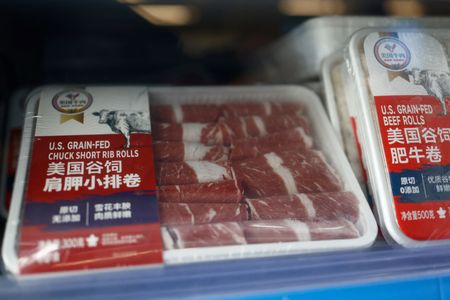By Ella Cao, Lewis Jackson and Tom Polansek
BEIJING/CHICAGO (Reuters) -China has extended for three months an investigation period for beef imports, the commerce ministry said on Wednesday, giving global suppliers a breather from the prospect of trade curbs as the domestic industry battles to reduce a supply glut.
The inquiry, launched last December, came as slowing demand squeezes the world’s largest market for imports and consumption, but does not target a particular country.
Trade measures to reduce imports could hit major suppliers such as Argentina, Australia and Brazil, after China has already restricted imports from the United States.
The investigation will now run until November 26, the ministry said, citing “the large volume of investigative work and the complexity of the case”. It also pledged to ensure a “healthy and stable” global trade environment by communicating with all parties.
“It’s definitely a relief to beef exporters,” said Even Rogers Pay, agriculture analyst at Trivium China.
“The extension buys Beijing a few months to see whether the domestic industry can regain profitability without safeguards, and hopefully to make progress on other issues with major beef exporters.”
Although trade measures such as quota curbs were still not completely off the table, it was more likely something could be worked out quietly rather than being imposed, she added.
Authorities have ramped up support for the industry, including financial measures. In July, an agriculture ministry official said beef cattle farming had been “generally profitable” for three consecutive months.
China imported a record 2.87 million metric tons of beef in 2024, but imports of 1.3 million metric tons for the first half of 2025 were down 9.5% on the year.
China has restricted imports of American meat by not renewing registrations that permitted shipments from hundreds of U.S. beef facilities after they expired in March, according to the U.S. Meat Export Federation, an industry group.
“The vast majority of our plants aren’t eligible to ship to China presently,” federation spokesperson Joe Schuele said.
“While the safeguard investigation is important, it’s not at the top of our minds. The most urgent situation is to get our plants registered for China.”
Without exports to China, the federation estimated the U.S. beef industry’s lost opportunities at about $4 billion annually.
“Consistent and transparent plant approvals, without expiration, were among the most important components of the 2020 Phase One Agreement with China,” federation President Dan Halstrom said, referring to the trade pact signed during U.S. President Donald Trump’s first term.
“It’s time for China to return to those commitments.”
(Reporting by Beijing Newsroom, Ella Cao and Lewis Jackson, and by Tom Polansek in Chicago; Editing by Clarence Fernandez and Stephen Coates)










